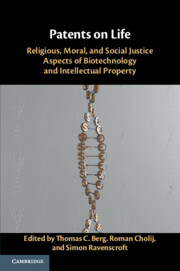 Patents on Life
Patents on Life from II - Religious Perspectives on Life Patents
Published online by Cambridge University Press: 28 September 2019
Life patents are a form of intellectual property protection being enshrined and strengthened in bi-lateral and multi–lateral trade agreements. The Church’s teaching and societal engagement to protect human rights has grown in response to the expanded use of patents on living matter, including human genes, DNA and stem cells, as well as microorganisms, plants and animals. This analysis is based on three assets of the work of the Church in the United States: 1) the teaching of the Church; 2) relationships with the Church in other nations; and 3) on–the–ground experience in developing nations, especially through the Conference’s relief and development agency, Catholic Relief Services (CRS). The paper explores two questions: What lessons can be learned from the Church’s engagement with life patents as they touch the rights of persons who are poor, indigenous or marginalized? How can the Church appropriately defend the rights of persons at the margins of the global economy, insuring their just and fair treatment, and their access to the life–saving benefits of life patents?
To save this book to your Kindle, first ensure no-reply@cambridge.org is added to your Approved Personal Document E-mail List under your Personal Document Settings on the Manage Your Content and Devices page of your Amazon account. Then enter the ‘name’ part of your Kindle email address below. Find out more about saving to your Kindle.
Note you can select to save to either the @free.kindle.com or @kindle.com variations. ‘@free.kindle.com’ emails are free but can only be saved to your device when it is connected to wi-fi. ‘@kindle.com’ emails can be delivered even when you are not connected to wi-fi, but note that service fees apply.
Find out more about the Kindle Personal Document Service.
To save content items to your account, please confirm that you agree to abide by our usage policies. If this is the first time you use this feature, you will be asked to authorise Cambridge Core to connect with your account. Find out more about saving content to Dropbox.
To save content items to your account, please confirm that you agree to abide by our usage policies. If this is the first time you use this feature, you will be asked to authorise Cambridge Core to connect with your account. Find out more about saving content to Google Drive.